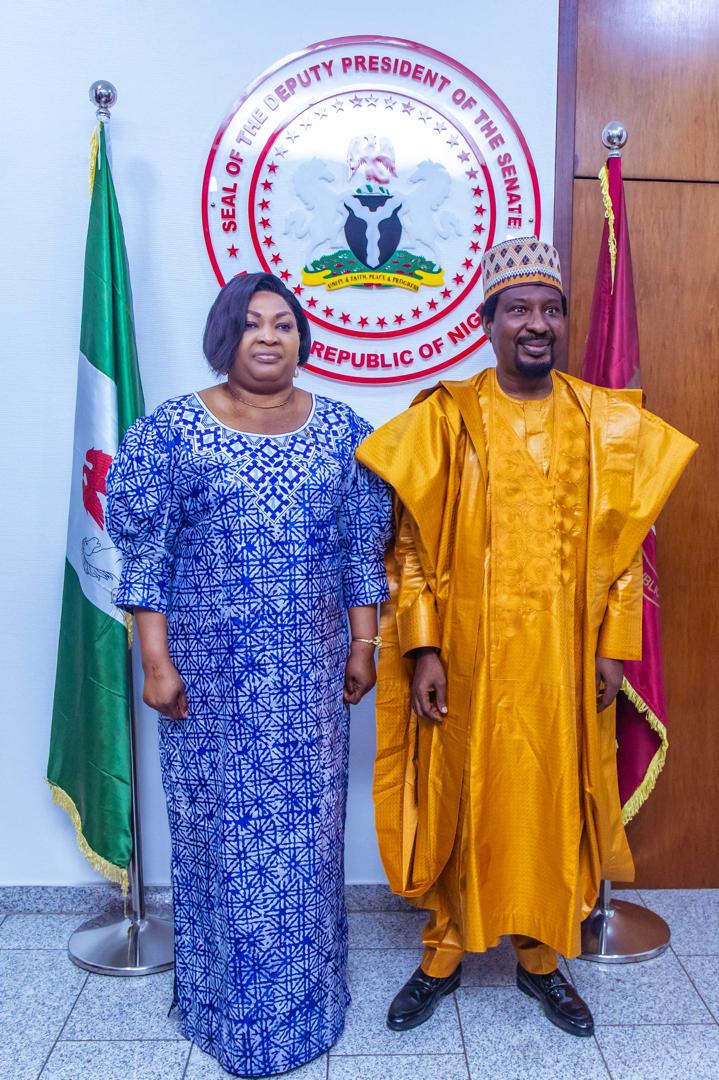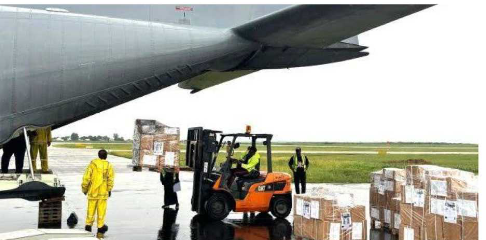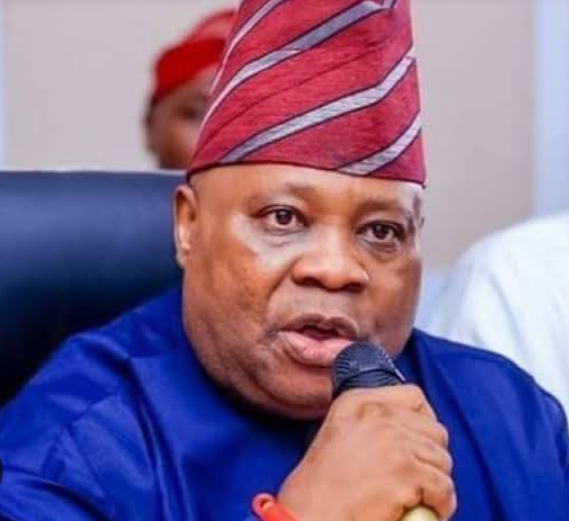News
VP Shettima Reiterates FG Commitment To Tackle Challenges Of Power Sector

VP Shettima Reiterates FG Commitment To Tackle Challenges Of Power Sector
By Gloria Ikibah
Nigeria’s Vice President, Kashim Shettima has said that in tackling the issues affecting the power sector, the Federal Government is committed to being a partner to the state governments and facilitating the shift towards increased state government participation in the electricity market as envisioned by law.
The Vice President stated this at a two-day power sector stakeholders interactive dialogue/workshop organised by the House of Representatives Committee on Power on Tuesday in Abuja, with the theme, “Confronting Nigeria’s Power Challenge As The Nation Migrates To A Multi-Tier Market: A Legislative Intervention”.
Shettima who was represented by Sadiq Wanka, said this will require an open channel of communication to adequately plan the transition, and respond to issues as they emerge.
He said: It will require a willingness to leverage all the knowledge that has been accumulated over the last decade of operating the current market structure, and to learn from the mistakes and successes therefrom. It will require a razor-eyed focus on the prize, which is energising Nigerian homes and businesses. The new structure must therefore prioritise providing an enabling environment at the state and wholesale market levels, and allow the private sector to lead the way across the value chain. And of course, it will require the federal and state governments to continue playing a balancing role, ensuring equity and keeping environmental considerations on the front burner.
Shettima who urged that the level of engagement of all stakeholders has to continue to be strong, as there are many issues yet to be resolve; therefore charged industry players to maintain a willingness to learn and adapt.
“In addition to the urgent need to adequately define what the new national electricity framework is, the introduction of new state electricity markets raises two prominent questions:
“The first is how do we ensure state readiness for the increased responsibility they are assuming in the new national electricity framework? While state governments can now regulate all electricity value chain activities within their borders, these new powers come with non-trivial responsibilities. Having the power to set tariff policy within state borders also comes with the responsibility of paying tariff shortfalls and subsidies that emanate from these policies. It comes with the responsibility of state governments guaranteeing payments to the national wholesale electricity market. Having the power to regulate electricity activities also means there is a need to build the capacity to ensure competent and independent regulators in each state market. It means states need to take a leading role in attracting investments to recapitalise distribution companies, and to ensure a steady flow of investments towards increasing electricity access.
“The second key question that becomes immediately apparent is how do we prioritise coordination and orderliness in the transition? It is important that investors have clarity and confidence in the roadmap and timelines for transition and for there to be a base level of standardisation across electricity markets so dealing with different regulatory bodies does not become too cumbersome and force investors to stay away.
“Similarly, there is need for us to maintain a level of flexibility in the transition process. For example, transitioning to state regulatory control requires distribution companies to set up state subsidiaries. But this is not a straightforward process. There are complex issues of asset delineation, equity negotiations with other investors in DISCOs and even infrastructure investments required to truly delineate the distribution network of one state from the other. There is a lot of re-organisation that needs to happen internally within DISCOs from a process and people perspective. All these among others require time and patience”, the VicePresidentstated.
He further said that with the wholesale structural shift that the Electricity Act 2023 (as amended) and the associated constitutional amendment usher in, it means there is the need to double down on ensuring an orderly transition to the new national electricity market framework.
“I congratulate the National Assembly for its steadfastness in leading the conversation through an orderly transition and for demonstrating a willingness to review the recently passed Electricity Act as needed.
According to him, the Electricity Act 2023 seeks to overhaul the structure of the Nigeria Electricity Supply Industry and proposes a structure that promotes more competition.
“The conversation we are having here today at this National Assembly event is very timely. At a moment that the energy quadrilemma is at the forefront of global discussions, in Nigeria, there is widespread recognition that we are underperforming across all four pillars of providing electricity supply that is reliable, affordable, environmentally sustainable and available to all Nigerians. Indeed, by some estimates, less than 20% of Nigerians have access to reliable energy of more than 12 hours per day. 45% of Nigerians have no access to any form of electricity. And as a result, households and industry have been dependent on self-generation that is both more expensive and more polluting.
“The Electricity Act 2023 that was passed by the National Assembly and signed into law by President Bola Ahmed Tinubu seeks to overhaul the structure of the Nigeria Electricity Supply Industry. It proposes a structure that promotes more competition and greater scope for tailoring power solutions to local needs, while transitioning to a market structure that would attract much needed investments and promote environmental sustainability.
“In this regard, I must congratulate the National Assembly for its steadfastness in leading the conversation on this orderly transition and for demonstrating a willingness to review the recently passed Electricity Act as needed. I would also like to congratulate the Honourable Minister of Power for his role in convening industry stakeholders towards the development of the Integrated National Electricity Policy and Strategic Implementation Plan, as envisioned by the new Act. Similarly, the Nigerian Electricity Regulatory Commission has continued to step up to the plate in translating the Electricity Act into enabling regulations that facilitate the transition to a new market structure. State governments have also demonstrated a unique sense of urgency and duty in playing their part towards domesticating the new Electricity Act and improving the energy situation for their populace”, he added.
Vice President Shettima asserted that there is a lot to be excited about with the new Electricity Act, which has the core elements of resolving the structural issues that have hindered investments in the sector – from liquidity challenges, to the inadequate legal framework.
He added that conversations are “key to ensure we are all adequately thinking through the implications of the new Act, and ensuring new structural issues are not being created”.
News
Ecoparl: Speaker Ibrahima Reaffirms Parliament’s Dedication to Regional Unity

News
Air Force Begins Moving Electoral Materials For Edo Guber Election

By Kayode Sanni-Arewa
The Nigerian Air Force (NAF) has began airlifting the sensitive election materials for the Independent National Electoral Commission (INEC) to Benin, Edo State, ahead of the upcoming governorship election scheduled for September 21, 2024.
This was disclosed on Wednesday by the Deputy Director, Public Relations and Information, Group Captain Kabiru Ali.
The operation is part of the NAF’s efforts to ensure the timely and secure delivery of materials necessary for a smooth electoral process.
This development reinforces the collaboration between NAF and INEC to facilitate logistics and ensure a peaceful election in Edo State.
The Chief of the Air Staff, Air Marshal Hasan Bala Abubakar, had previously reiterated NAF’s commitment to providing airlift support for the swift movement of electoral materials during a meeting with INEC Chairman, Professor Mahmood Yakubu.
This airlift operation is a crucial aspect of NAF’s constitutional responsibility to provide Military Aid to Civil Authority, underscoring the force’s dedication to supporting democratic processes in Nigeria. With the election just days away, the NAF’s timely intervention will help ensure the successful conduct of the governorship elections in Edo State.
Governor Godwin Obaseki of Edo State had earlier accused the Inspector General of Police, Kayode Egbetokun, of working with the All Progressives Congress (APC) to hunt the Peoples Democratic Party (PDP) members and supporters in the state and force them into hiding ahead of September 21 governorship election.
Obaseki, who made the allegation when a delegation led by the former Head of State, Abdusalam Abubakar, met with him to get the governor and his party to sign peace accord, said that the IGP had made nonsense of his (Obaseki’s) role as the chief security officer of the state.
The governor had said that the police chief obtained a warrant to arrest 60 members and supporters of PDP in Edo and that the IGP sent an armed “gang” of policemen who invaded the state, attacked PDP members, shot at a local government chairman and arrested 10 persons who are currently being detained in Abuja without charges.
Asked by the former head of state if his party would sign the peace accord, Obaseki said, “The person who is supposed to enforce the peace accord is now an active participant in creating a destructive environment.
“We are now in a situation where from the Inspector General’s office, there are armed gang policemen who came into Edo State, invaded, arrested and took away PDP members.
News
“Dancing gives me abundant joy and peace of mind”-Gov Adeleke

By Kayode Sanni-Arewa
The Governor of Osun State, Ademola Adeleke, has given reasons why he loves dancing.
The ‘Dancing Governor’, as he is fondly called, revealed this on Wednesday while responding to a tweet on X.
An X user, @Iwogoke, while praising the governor, stated that Adeleke has been busy fulfilling his electoral promises to the people of Osun State, while his political opponents believe he is only good at dancing.
Iwogoke tweeted, “I’m not flattering you, Your Excellency, your opponents think you can only dance but while they are busy shouting and calling you ‘Dancing Governor’, you are busy fulfilling your electoral promises to the people.”
Responding to the tweet via his verified X account, Adeleke explained that he loves dancing because it brings him joy.
Speaking further on his love for dancing, Adeleke highlighted that while dancing brings him immense happiness, his greater fulfilment comes from delivering the dividends of democracy to the people of Osun.
Outlining his administration’s efforts to enhance the state’s infrastructure, he noted that primary health centre rehabilitation is underway in at least 200 out of the 332 wards across Osun State, adding that road construction projects are also progressing in every local government area.
He wrote, “Dancing gives me joy, but delivering on my electoral promises and providing the dividends of democracy to the good people of Osun gives me even greater joy. Rehabilitation of primary health centers is ongoing in at least 200 out of 332 wards, and road construction is progressing in every Local Government!”
-

 News21 hours ago
News21 hours agoPHOTOS: Finally, FCT Minister, Wike settles with the Duke, Nduka Obaigbena, publisher of Thisday, Arise Tv
-

 News21 hours ago
News21 hours agoOver 3000 Lagos Residents Rendered Homeless As Govt Officials, Policemen Demolish, Set Buildings On Fire
-

 News17 hours ago
News17 hours agoPopular Ekiti Born Philanthropist, Funso Ayeni Bags PhD in US Varsity
-

 Politics20 hours ago
Politics20 hours agoRivers PDP elders tackle Ada George over attack on Wike
-

 Economy18 hours ago
Economy18 hours agoSEE Black Market Dollar (USD) To Naira (NGN) Exchange Rate Today
-

 News21 hours ago
News21 hours agoFG Issues Flood Alert As Cameroon Releases Water From Lagdo Dam
-

 News15 hours ago
News15 hours agoJust in: Wanted ex-Kogi gov, Yahaya Bello honours EFCC invitation
-

 News21 hours ago
News21 hours agoHire and fire Gov Fubara fires LG chairman, appoints caretaker immediately








